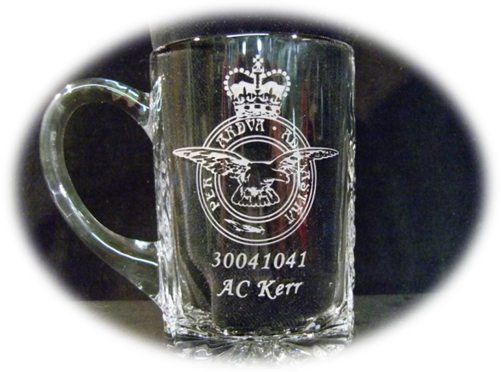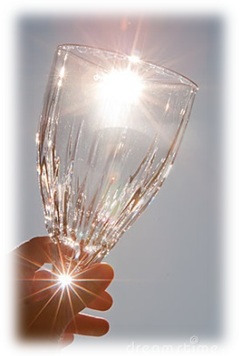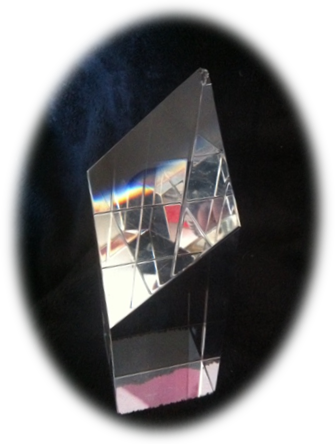Care of Your Glassware
 Care of Crystal and Glassware
Care of Crystal and Glassware
Brief Introduction
Lead crystal with 24% lead oxide content, is an amazing material and is noticeably different from ordinary glass. Crystal is completely transparent and colourless and because of this, is more sparkling. It has a greatly enhanced brilliance over ordinary glass and has optical properties approaching that of diamonds.
 Lead crystal epitomises the beauty and purity of glass and has an undeniable elegance e.g. when serving drinks in crystal glasses. It helps to know how to tell the difference, because blank lead crystal is usually of greater value than cut glass and consequently requires a little more care and attention, when cleaning.
Lead crystal epitomises the beauty and purity of glass and has an undeniable elegance e.g. when serving drinks in crystal glasses. It helps to know how to tell the difference, because blank lead crystal is usually of greater value than cut glass and consequently requires a little more care and attention, when cleaning.
Is Your Glassware Crystal?
There are certain things you can do, to tell if your glass vases and stemware are lead crystal or regular glass. Here are a couple of quick checks you can make yourself:
1. Examine a piece of ordinary glassware and a piece of crystal and hold each piece up to the light. Glass will typically have a greenish tint, while crystal is completely clear. Crystal will also refract the light, producing a rainbow effect. Crystal will also appear to glint and sparkle, more than ordinary glassware, because of the embedded lead oxide particles. Ordinary glassware will not produce any effect.
2. Lifting an item may also help ascertain whether an object is made from lead crystal, or glass. Lead Crystal is much heavier than glass, because any item sold in the UK as lead crystal, must contain at least 24% lead oxide. If you are trying to determine whether a piece is glass or crystal, compare it with the weight of a similar size piece which you know to be glass. If your first piece is made of crystal, it will be noticeably heavier than the glass piece.
3. Gently tap your fingernail against a curved area of the glassware and note the sound it makes. Crystal has a wonderful resonance and a unique ringing tone, which will continue to vibrate for a short time. When ordinary glassware is tapped it will produce a dull [thud like] sound and will not vibrate.
Caution
All information provided here, is given in good faith and we believe it to be correct. It is based on our own experience, or has been gleaned from other expert sources. However, we cannot be held responsible for any damage or breakages to your crystal or glassware resulting from the use of this information.
Care Of Your Crystal
Crystal is truly a thing of immense beauty, but this can be seriously reduced, if damaged - especially chipped. You should bear in mind that damaged crystal can never be completely restored to its original condition, even by a professional.
With proper care and careful handling, you can maintain the beautiful, sparkling look of your crystal. Cleaning it correctly will ensure it remains this way and does not become cloudy, or foggy in appearance
General Tips And Advice
1. Avoid exposing glassware to extremes of temperature or rapid, extreme temperature changes.
2. To safely remove dirt, dust and smudges from the surface of glasses, add one tablespoon of mild liquid dishwashing detergent to a bowl of warm water and ‘wash’ the dirt off. Wiping dirt or dust off with a dry cloth can cause surface scratching.
3. Do not use crystal in a conventional oven, or microwave.
4. Do not place crystal in a freezer, or refrigerator.
Cleaning Crystal Or Glassware
Crystal glassware should be cleaned by washing with care, to prevent leaving unsightly marks, or causing needless damage. Although hand washing should be used every time, there is some crystal that is termed ‘dish washer safe ’.
Flowers in a vase can make chemical changes to the water. To avoid this happening and possible permanent damage to your glass vases, water should be changed daily.
Keep your drinking glasses crystal clear by washing them by hand.
Hand Washing Procedures
Tips And Advice
When hand washing crystal, it is advisable to use a plastic washing up bowl, or a rubber mat, on the base of the sink, because crystal can easily chip, if hit against the sink, or other glasses.
1. When washing your crystal it is important that the water is not too hot. If the water is too hot for your hands then it is too hot for washing crystal. Excessively hot water can cause crystal to crack.
2. When rinsing it is also important that you use water of a similar temperature. If you suddenly plunge your glasses in cold water the rapid change of temperature can also cause cracking.
3. When washing crystal glasses you should try and wash them one at a time. Washing them together can cause scratches, cracks or chips.
4. Because dust can be very abrasive try to keep your crystal in a dust free place. If your crystal should get dusty it is always wise to wash it rather than wiping the dust off as this can cause scratches
5. Remove rings or any other jewellery from your hands before washing glasses. Rings can cause scratches to crystal.
Process
1. Wash crystal in hot water, (but not too hot - as described above), with a small amount of liquid detergent added to the water. Wash glassware using a soft cloth or sponge being particularly careful with items such as wine glasses and flutes.
2. After cleaning rinse the glassware in clean warm/hot water and always hand dry the glasses with a soft clean lint free cloth. If you leave them to dry on their own you will often find water spots, a cloudy film or streaking that dulls the look of the glasses.
3. Check for marks on each glass by looking at them in a suitably lit place.
When your precious glasses have been washed and dried to your satisfaction it is important that you take care when storing them. Crystal glasses of any description should never be stacked inside each other. They should be stood on their bases, never the rims and neither should they be touching any others. If you have a proper glass rack, they can be hung upside down by the bases.
Removing Residue From Glasses
If you have crystal glasses that are marked with a residue and you have time to wash your glasses by hand you can make your glasses sparkle naturally. Leave them looking flawless and as clear as crystal should be. A little rubbing and the right water / liquid soap / vinegar mixture will take care of most stains.
Try this method
Mix together 2 litres of warm to hot water, 1 cup white vinegar and 1 tablespoon of liquid soap. Gently place the glasses in this soapy water mixture and let them sit for 10 to 15 minutes. During this time the vinegar should remove residue that has built up, even in the corners and hard to reach places.
Remove the glasses one at a time and rub with a cleaning cloth that has been soaked in the water and soap mixture.
After cleaning, rinse the glasses in a bowl of warm to hot water which has been added a ¼ cup of white vinegar and hand dry the glasses with a soft, clean lint free cloth.
This method will only remove film and any build-up of residue on the surface. It cannot remove permanent surface damage, (like etching), from crystal e.g. damage that has been caused by using a dishwasher, or if the crystal surface has suffered damage from abrasive detergents, or other marks resulting from being cleaned in a dishwasher.

Machine washing
Washing crystal in a dish washing machine is not usually recommended because the heat and detergent can scratch or mark the crystal. Over time the crystal may become cloudy and less shiny losing its natural beauty.
If the dishwasher causes your glasses to appear cloudy they need to be cleaned by hand (as above) and cleaned as soon as possible as they will become harder to clean if you leave them.
If you do not have time to hand wash glasses and have to use a dishwasher we suggest you use these settings:
1. Use only the recommended amount of mild detergent.
2. Set the dishwasher at the lowest temperature and shortest washing cycle (use a china or crystal setting if your machine has one).
3. Carefully load the machine so that the pieces of crystal do not touch each other and cannot move, or become displaced by water action.
4. Set the dishwasher at the coolest drying cycle.
Further cleaning suggestions
There are a whole host of other recommended methods to clean crystal. These are only further suggestions; use whichever is your preferred method.
To remove cloudy film caused by hard water first soak the glassware in warm, undiluted white vinegar for 1 hour, then hand wash as usual.
Fill foggy drinking glasses or vases with 1 or 2 tablespoons of lemon juice and rub the glass exterior with half a lemon. Fill with warm water and allow to stand for a few hours, then hand wash glasses as normal.
To achieve the ultimate sparkling glasses, some people swear by polishing their glasses with a soft cloth or paper napkin and methylated spirits. As the methylated spirits evaporate it should not be a problem – apparently!
Vases and Decanters
A natural way of cleaning crystal vases and decanters is by pouring in 1/4 to 1/2 cup of uncooked rice with warm water. Fill about halfway and gently swirl the mixture around to clean the inside surfaces.
Discard the rice and water, pour in a small amount of liquid soap and add water to the decanter. Once again swirl the mixture around to remove any remaining dirt from the inside and then empty out the mixture.
Rinse with warm water to which some vinegar has been added. This will help stop water spots from appearing inside and keep your crystal sparkling. Also adding vinegar to the rinsing water used for the crystal can help reduce the deposits left, especially in the difficult to reach places.
Dry by wiping gently with a soft, clean lint free cloth to prevent water spotting.
For particularly stubborn marks pour in white vinegar until it is above the level of any stains, and gently swirl around. Leave standing overnight then pour the vinegar out and rinse with warm water. The vinegar should have removed any stains but if not repeat the treatment again.
Preparing to use your crystal for the first time
It is recommended that you follow the procedure below before using new crystal containers e.g. decanters
1. Fill with an equal mixture of warm water and vinegar and leave to stand for 24 hours.
2. Wash using a small amount of liquid detergent and warm water.
3. Empty and rinse with warm water.
Repairing glassware
If you are unlucky enough to break a piece of your crystal glassware there are some very good quality glues available. These are designed especially for crystal and which if used correctly can repair some damage. Unfortunately it is not possible to restore crystal glassware to an "as new" condition.
If you damage an irreplaceable heirloom or very expensive piece of crystal use the services of a professional crystal restoration specialist at a fine glass or crystal repair shop. Having repairs carried out in this manner is by far the best way to restore crystal and is the least likely to cause further damage


